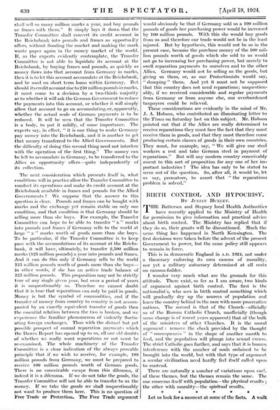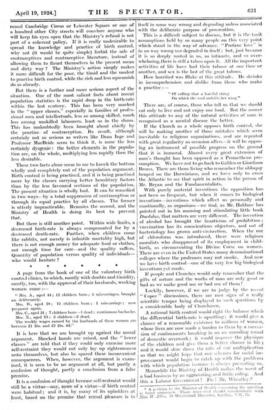BIRTH CONTROL AND HYPOCRISY. BY JULIAN HUXLEY. ri - mE Battersea and
Stepney local Health Authorities have recently applied to the Ministry of Health for permission to give information and practical advice about birth control. The Ministry has replied that if they do so, their grants will be discontinued. Much the same thing has happened in North Kensington. The first decisions were taken before the advent of the present Government to power, but the same policy still appears to remain in force.
This is indemocratie England in. A.D. 1924,- not under a theocracy enforcing its own canons of morality, nor yet a military autocracy determined at all costs on cannon-fodder.
I wonder very much what are the grounds for this attitude. There exist, so far as I am aware, two kinds of argument against birth control. The first is the nationalist's, who sees in birth control something which will gradually dry up the sources of population and leave the country behind in the race with more procreative nations. The second is that of the Church—officially so of the Roman Catholic Church, unofficially (though some change is of recent years apparent) that of the bulk of the ministers of other Churches. • It is the moral argument : remove the check provided by the thought of " consequences " in the shape of another mouth to feed, and the population will plunge into sexual excess. The strict Catholic goes further, and says'that it is human interference with the number of souls ordained to be brought into the world, but with that type of argument a secular civilization need hardly feel itself called upon to contend.
There are naturally a munber of variations upon each of these themes, but the themes remain the same. The one concerns itself with population—the physical results ; the other with morality—the spiritual results. -
* * . * - Let us look for a moment at some of the facts. A walk
round Cambridge Circus or Leicester Square or one of a hundred other City streets will convince .anyone who will keep his eyes open that the Ministry's refusal is not part of a coherent policy. If it is really undesirable to spread the knowledge and practice of birth control, why not. (it would be quite simple) . forbid the sale of contraceptives and contraceptive literature, instead of allowing them .to flaunt themselves in the present mean and dirty way ? The Ministry's action simply makes it more difficult for the poor, the timid and the modest to practise birth control, while the rich and less squeamish do so already.
But there is a further and more serious aspect of the situation. One of the most salient . facts about recent population statistics is the rapid drop in the birth-rate within the last century. This has been very marked . in the " upper classes," especially in families of profes- sional men and intellectuals, less so among skilled, much less among unskilled labourers, least so in the slums.
This has undoubtedly been brought about chiefly by the practice of contraception. Its result, although certainly not so serious as writers like Dean Inge and Professor MacBride seem to think it, is none the less certainly dysgenic the better elements. in the popula- tion are, on the whole, multiplying less rapidly than the less desirable.
. These two facts alone seem to me to knock the bottom wholly and completely out of the population argument. Birth control is being practised, and it is being practised more by the classes carrying better hereditary factors than by the less favoured sections of the population. The present situation is wholly bad. It can be remedied in two ways—by a total suppression of contraception or through its equal practice by all classes. The former is utterly impracticable. Remains the second, and the Ministry of Health is doing its best to prevent that.
But there is still another point. Within wide limits, a decreased birth-rate is always compensated for by a decreased death-rate. Further, when children come like rabbits, not merely is infantile mortality high, but there is not enough money for adequate food or clothes, not enough time for care—and the quality suffers.
Quantity of population versus quality of individuals— who would hesitate ?
* * - * A page from the book of one of the voluntary birth control clinics, to which, mostly with doubts and timidity, mostly, too, with the approval of their husbands, working women come :- "Mrs. A., aged 44 ; 12 children born ; 5 miscarriages, brought on deliberately.
Mrs. B., aged 38 ; 12 children born ; 1 miscarriage ; now pregnant again.
Mrs. C., aged 31 ; 7 children born-1 dead ; continuous backache. Mrs. X., aged 23 ; - 5 children-3 dead.
The weekly wages earned by the husbands of these women are between £1 10s. and £2 10s. 6d."
It is here that we are brought up against the moral argument. Shocked hands are raised, and the " lower classes " are told that if they could only exercise more self-restraint they would not only lay up righteousness unto themselves, but also be spared these inconvenient consequences. When, however, the argument is exam- ined, it is seen to be no argument at all, but partly a confusion of thought, partly a conclusion from a false premise.
It is a confusion of thought because self-restraint would still be a virtue—nay, more of a virtue—if birth control were habitual ; and it is, by many of its upholders at least. based on -the premise that sexual pleasure is in itself in some way wrong and degrading unless associated with the deliberate purpose of procreation.
This is a difficult subject to discuss, but it is the tacit assumptions held by so many people on this very point which stand in the way of advance. "Profane love" is in no way wrong nor degraded in itself ; but, just because it is so deeply rooted in us, so intimate, and so over- whelming, there is still a taboo upon it. All the important activities of life have had their taboos at one time or another, and sex is the last of the great taboos. - How horrified was Blake at this attitude. He shrinks in incomprehension and dislike from those who make a praCtice _ " Of calling that a hateful thing
On which the soul unfolds her wing."
There arc, of course, those who tell us that we should eat only to -live and not enjoy our food. But the sooner this attitude to any of the natural activities of man is recognised as a mental disease the better.
If the Church as a whole opposes birth control, she will be making another of those mistakes which seem inevitable to religious organizations, and are repeated with great regularity as occasion offers—it will be oppos- ing all instrument of possible progress on the ground that it is immoral. Almost every great extension of man's thought has been -opposed as a Promethean pre- sumption. We have not to go back to Galileo or Giordano Bruno. There are those living who remember the obloquy heaped on the Darwinians, and we have only to cross the Atlantic to sec that spirit in action in the person of Mr. Bryan and the Fundamentalists.
With purely material inventions the opposition has not been so frequent, but when it comes to biological inventions—inventions which affect us personally aiid emotionally, as organismsL-we find, as Mr. Haldane has pointed out in his amusing and stimulating little book Daedalus, that matters are very different. The invention of alcohol has brought the fanaticism of prohibition ; vaccination has its conscientious objectors, and out of bacteriology has grown anti-vivisection. When the use of chloroform was introduced, there were religious moralists who disapproved of its employment in child- birth, as circumventing the Divine Curse on women. There are even in the United States many denominational colleges where the professors may not smoke. And now we have birth control—one of the very few big biological inventions yet made.
If people and Churches would only remember that the gifts of nature and the works of man arc only good or bad as we make good use or bad use of them !
Luckily, however, if we. arc to judge by time recent " Copee " discUssions, there are now signs of a really scientific temper being displayed to such questions by a considerable body of Churchmen. - A rational birth control would right the balance which the differential birth-rate is upsetting ; it would give a chance of a reasonable existence to millions of women, whose lives .are now made a burden to them by a succes- sion of confinements breaking in on all unending round of domestic overwork ; it would improve the physique of the. children and give them a better chance in life ; and it would slow down the rate of our multiplication so that we might hope that our schemes for social im- provement would begin to .catch up with the problems with which population increase is always presenting us. Meanwhile the Ministry of Health makes the worst of -a bad business by an aggravating and futile ruling. And this a Labour Government ! Fic ! Mr. Wheatley.* * A petition io the Minister of Health concerning the question is beim; organized. • Those interested shoulii communicate with Tiliss 31 Alicia,. 7Q Ovcrstrand Maitions, lao.ndon, S.W. 11.



































 Previous page
Previous page